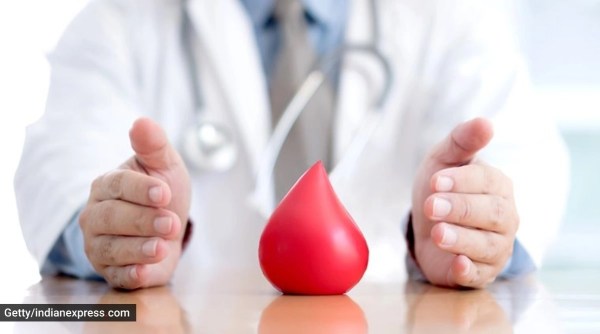Bombay Blood Group: Only 1 in 10,000 Indians have this, can be stored only for about 40 days; know all about it
In 2003, the delivery of a pregnant woman was delayed for nearly 15 days at Christian Medical College, Vellore because a donor could not be found for the woman’s rare blood group – the Bombay Blood Group (BBG), characterised by the absence of the H antigen.
The woman was lucky to find a donor in Amitabh Kumar, who happened to be at the same hospital for his mother’s treatment. “I learned about the requirement while roaming around in the blood bank. I donated immediately,” said Kumar, who is originally from Jamshedpur.
 https://images.indianexpress.com/2020/08/1x1.png
https://images.indianexpress.com/2020/08/1x1.png
Kumar learned about his rare blood group in 1996 after volunteering to donate blood. “Jamshedpur Blood Bank informed me about this blood group. They motivated me to become a volunteer donor. Then I gathered more information around the uniqueness of this blood group,” Kumar recalled in an interview with indianexpress.com. Now 45, Kumar has donated blood 35 times already.
“I was so happy that both the mother and the child were safe after delivery and I could make that small contribution towards it,” Kumar said. “Small” but not insignificant. Unlike other blood groups, BBG can only receive and donate to the same blood group. According to the National Institutes of Health, only one in 10,000 Indians has it, and four in a million people worldwide.
What is the Bombay Blood Group all about?
As the name suggests, this rare blood type was first discovered in Bombay (now Mumbai), India, in 1952. Also known as ‘hh’ or ‘Oh’ blood group, this lacks the H antigen, the precursor to the A and B antigens found in the more common ABO blood group system. As a result, they cannot form A or B antigens, regardless of their genetic makeup, for the ABO blood group system.
“BBG individuals produce anti-H antibodies that react against red blood cells with the H antigen, making transfusions challenging. They can only receive blood from other BBG individuals, as transfusions from any other group, including O, can cause severe reactions,” said Dr Ashish Dixit, consultant at Manipal Hospital, Bengaluru.
The Bombay phenotype is inherited in an “autosomal recessive manner,” requiring two copies of the hh allele from each parent to exhibit the BBG phenotype. Dixit explained that specific blood typing tests are needed to identify BBG, as standard ABO methods may not detect it. While extremely rare globally, BBG is more common in India and among individuals of Indian descent.
 BBG is extremely rare globally “but is more commonly found in certain populations, particularly in India (Source: Getty Images/Thinkstock)
BBG is extremely rare globally “but is more commonly found in certain populations, particularly in India (Source: Getty Images/Thinkstock)
Challenges
Difficulty in locating compatible donors
“Finding matching blood for BBG patients heavily relies on local blood banks, which may have limited supplies,” said Dr Brunda M S, consultant, internal medicine, Aster CMI Hospital, Bangalore.
Delays in finding compatible blood can significantly impact patient outcomes. “In critical situations, every minute counts,” said Brunda. Without a centralised database, identifying potential donors for rare blood groups, including BBG, is challenging. “Donors with rare blood types may be scattered across different regions, making it difficult to find a match quickly without a national repository,” said Dixit. This delay can result in life-threatening complications for patients requiring urgent transfusions, increasing risks of adverse health outcomes or even mortality.
Hyderabad-based retired scientist Satish Mahesekar, who has donated blood over 40 times, experienced this firsthand when he needed blood during a dengue infection in 2004-05 but couldn’t find a donor. “I am fully aware that this blood group is so rare that I may not easily get it on time if I need it again,” Mahesekar said, noting that he has donated blood to terminally-ill patients, knowing they might not survive. He discovered his rare blood group when he had to donate to his sister during her delivery.
Shelf life
Any blood has a shelf life of a maximum of 35-42 days depending on the blood bank maintenance. Managing the supply and demand of rare blood types is “inefficient, leading to potential wastage of donated blood and shortages when it is critically needed”, noted Dixit.
Lack of a national registry of rare blood groups
Medical experts urge the creation of a national registry to connect donors across the country, significantly increasing the chance of a timely match. Dixit said that a national repository would improve the recruitment, retention, and coordination of rare blood donors. Without it, efforts to maintain an adequate donor pool are fragmented and less effective. Establishing a national repository for rare blood groups would provide a centralised, efficient, and reliable system for managing and locating rare blood donors, thereby improving patient outcomes and healthcare efficiency.
 Blood may be needed during deliveries (Source: Getty Images/Thinkstock)
Blood may be needed during deliveries (Source: Getty Images/Thinkstock)
What’s being done?
Blood banks and the National Institute of Immunohaematology help, as do individuals like Vinay Shetty through his NGO Life Blood Council, which arranges for rare blood groups. Efforts to build a national registry of rare blood groups are underway, led by Mumbai-based Shetty in collaboration with the Government of India’s National Institute of Immunohaematology (KEM Hospital).
Shetty, who has been maintaining a database since the 2000s, said there are over 400 people with this rare type, mostly in Maharashtra and southern states. “The North and East (of India) are still unorganised. We have appealed to all state governments to inform us of any person with this rare blood group as a routine practice. We want blood banks across the country to adopt this practice and increase testing to enlist such donors,” Shetty said.
Disclaimer: The copyright of this article belongs to the original author. Reposting this article is solely for the purpose of information dissemination and does not constitute any investment advice. If there is any infringement, please contact us immediately. We will make corrections or deletions as necessary. Thank you.

